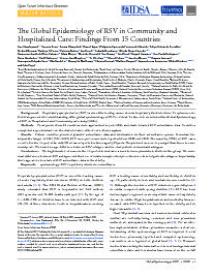The global epidemiology of RSV in community and hospitalized care : findings from 15 countries
Background: Respiratory syncytial virus (RSV) is one of the leading causes of acute respiratory tract infections. To optimize control strategies, a better understanding of the global epidemiology of RSV is critical. To this end, we initiated the Global Epidemiology of RSV in Hospitalized and Community care study (GERi).
Methods: Focal points from 44 countries were approached to join GERi and share detailed RSV surveillance data. Countries completed a questionnaire on the characteristics of their surveillance system.
Results: Fifteen countries provided granular surveillance data and information on their surveillance system. A median of 1,641 (IQR:552 – 2,415) RSV cases per season were reported from 2000 and 2020. The majority (55%) of RSV cases occurred in the <1-year-olds, with 8% of cases reported in those aged ≥65 years. Hospitalized cases were younger than those in community care. We found no age difference between RSV subtypes and no clear pattern of dominant subtypes.
Conclusions: The high number of cases in the <1 year-olds indicates a need to focus prevention efforts in this group. The minimal differences between RSV subtypes and their co-circulation implies prevention needs to target both subtypes. Importantly, there appears to be a lack of RSV surveillance data in the elderly.
In: Open Forum Infectious Diseases ; ISSN: 2328-8957 | 8 | 7 | juli | ofab159
https://doi.org/10.1093/ofid/ofab159
Open access


